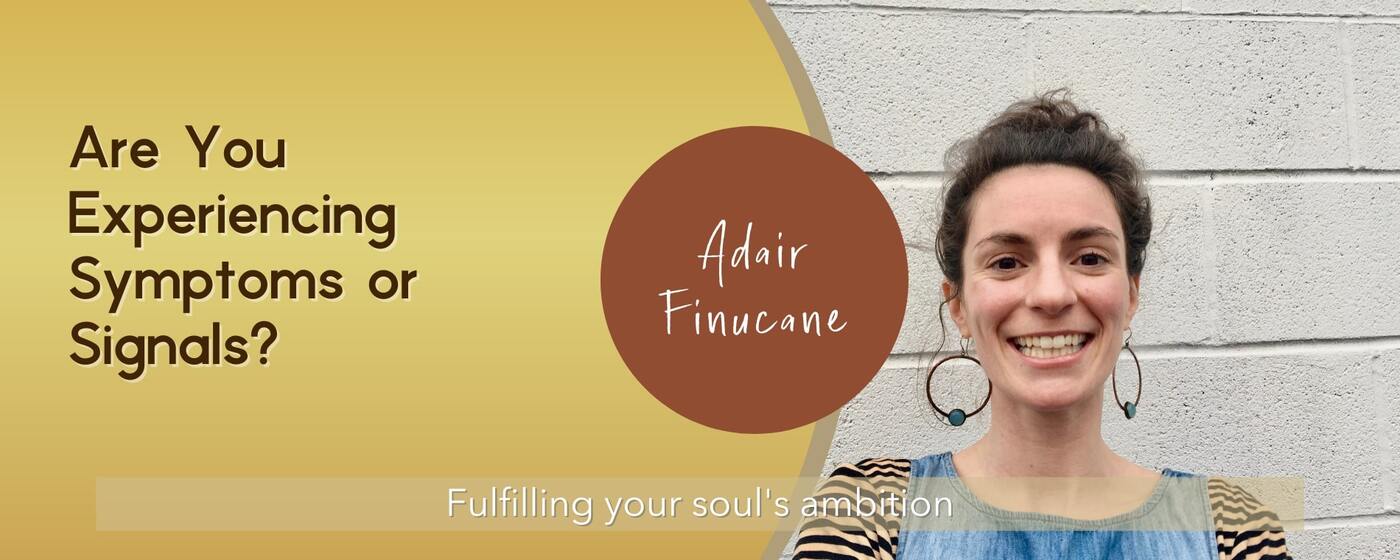
Are You Experiencing Symptoms or Signals?
The world most of us grew up in taught us to look at our issues (mental health, physical, etc.) through the lens of the medical model. This model studies, diagnoses, and treats symptoms. There are problems, and there are answers. And often between these two points, there is a doctor or psychologist who has the authority to treat you. Now, the medical model can be super effective, and there are many great docs and mental health professionals out there doing good work. My issue with the medical model is that it’s way overblown – it’s crept too far into our experience of being alive, and has gone beyond what is helpful.
I believe in regularly examining the lenses we use to understand what’s happening with our minds, our bodies, and our spirits. I also believe in being open to changing perspectives, so that our lives have more ease and flow. And so that we have access to more joy. If we’re experiencing symptoms (e.g. anxiety, depression, digestive issues) and we’re not feeling our best, it’s worth asking: Am I looking at this experience as a symptom, or as a signal? I first heard about the concept of “symptoms vs. signals” from Thea Monyee, a therapist and writer who does a lot of work around pleasure activism. It changed the way I relate to my own mental and physical health, and to how I help others with theirs.
So. My invitation to you is to get curious about how to interpret your mind-body challenges.
What’s going on with you right now? How does your body feel – in terms of ease of movement? Digestion?
How about your energy levels? What are they like?
What do you notice about the quality of your mind? Is it scattered? Focused? Is it open and expansive, or does it tend to dive in exhausting negative spirals?
And speaking of which, how’s your mood these days? Stable? Changeable? Rollercoaster?
If you hit on things that you don’t want to be experiencing, like worry, abusive internal dialogue, or relational issues, one option is to see them as symptoms. When we see something as a symptom, there’s often an underlying belief of “there’s something wrong with me.” Identifying symptoms can even lead us to feel like we’re in this boat because of some kind of moral failing.
This isn’t the only way to view things, though. You could see any of these challenges as signals that something in your life is out of balance. Maybe you’re out of alignment in how you live your values, or with your habits. Or maybe you’re living or working in a toxic environment. A signal that you’re out of balance suggests that A) something’s not quite right, and B) you might want to get cracking on figuring out what that is.
Using a “symptoms” lens can lead us to think there’s something wrong with us. Then we go to a professional because we’ve internalized this concept that they know how to fix us. Again, I’m not knocking doctors and therapists. I’m knocking our willingness to sell ourselves short by outsourcing wisdom that’s inherently ours. This is a wisdom that’s always a breath or two away. By all means, get the help you need – just don’t forget to ask yourself What is this trying to teach me? rather than focusing on What is wrong with me?
For some, it’s easy to become accustomed to things – to tolerate that which is uncomfortable. To become numb to what feels insurmountable. I don’t know how to take this thorn out of my foot so I guess I’ll just limp around for a few years. You know, when you have that issue with your knee, or with your teeth, but you sweep it under the rug because it’s not going to kill you? That kind of thing. It’s also easy to complain about what’s not going right. Complaining in particular pulls any curiosity to a dead halt. You might also be taking action and not getting results – like seeing the same therapist for 5 years and not experiencing changes in depressive symptoms. When this happens, it’s worth asking: is this action working? And if it’s not, and you’ve been continuing to throw the same response towards it, that’s an indicator that you’ve been seeing the issue as a symptom: as something that’s wrong with you. An alternative is periodically reevaluating to look for signals: What else needs to change here? How do I need to orient myself towards this so that I can help it move on?
Then there’s my current pet peeve: over-identifying with emotional experiences to the point that we refer to “my depression,” or “my anxiety.” Believe me, I’ve been there, and I’m not going back. I recently had two people over the course of the week asking me about “my anxiety.” Both times, my response was passionate. “My anxiety? There is no such thing as my anxiety. I am a person who has experienced a lot of anxious states over the years. But ‘my anxiety’ doesn’t exist. ‘My’ suggests that it’s actually a part of me. It suggests ownership. That’s the last thing I want to identify my essence with.”
To me, referring to “my [insert symptom here]” is a really dangerous way of thinking, because we can get stuck in imaging that we’re actually just victims to this experience – that it’s descended upon us, and we have to put up with it. I’m not trying to downplay anyone’s experience with what we in the West call mental illness – I’ve experienced plenty of deep emotional and mental imbalance, and it’s a really tough place to be. I believe that in order to get out from under a powerful imbalance, we have to be willing to shift our relationship with it.
The language we use matters. It offers a look into how we’ve structured our minds. Is there anything more important than how we choose to structure our minds? When we choose language that identifies problems as temporary states rather than heavy burdens we’ve been indefinitely saddled with, we’re choosing agency. We’re choosing freedom.
When you seek signals, you will find signals. Signals can be indicators that things are going swimmingly (e.g. being in a productive flow, starting to have more good days than bad). As signs that something’s not going right, they can be godsends that keep us from wandering even further down the path of ignorance. These signals tell you that something about how you’re living, what relationships you’re engaging in, or about your environment, is leading you to be off-balance.
The choice of lens really is yours to make. It can start with seeing the symptoms of worry, or abusive self-talk, or panic that’s so deep in your chest you think you might die – seeing those as signals that something needs to change. And owning the fact that if you don’t initiate the change, it ain’t gonna happen. Then find people who believe in taking action on what they see through the lens of signals. We shift in conjunction with others, and we’re influenced by those we spend time with (and by the people they spend time with). If we’re not spending time with people who share our newly forming values, they might get washed away in the current of our old patterns. Seek people who see things in a way that you’d like to start seeing things. When you start doing this, you’ll find yourself feeling a lot more empowered. You’ll also be amazed at how much more sensitized you become to reading your signals. And that’s the most magical thing of all: we call it intuition.


